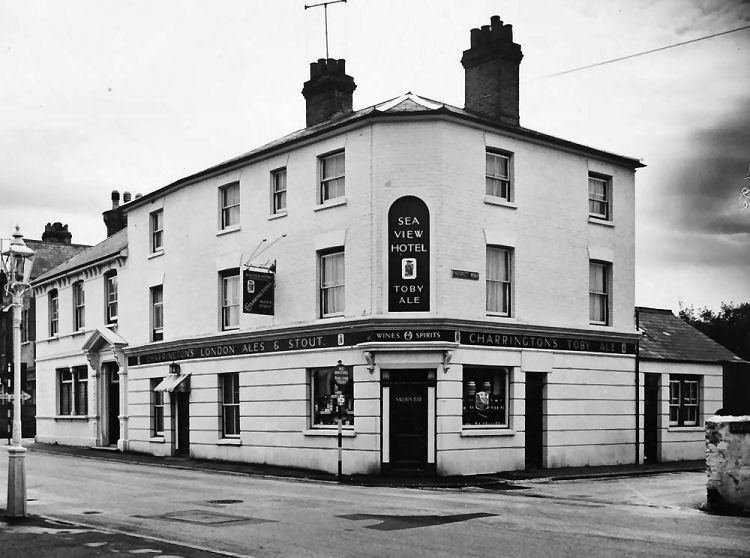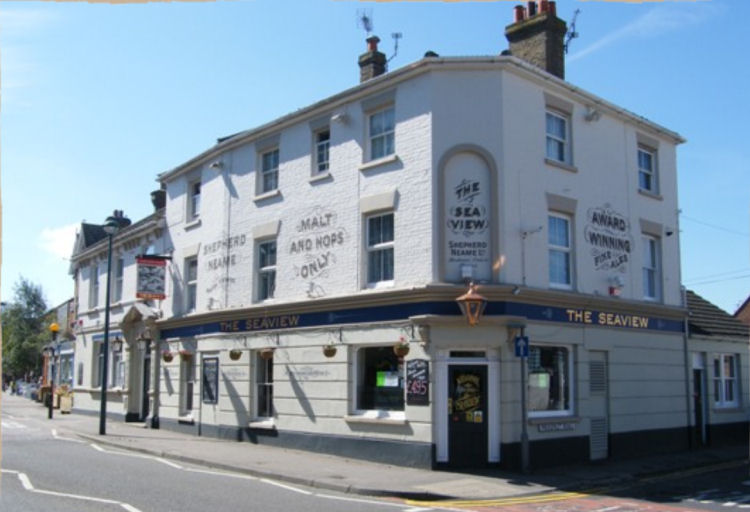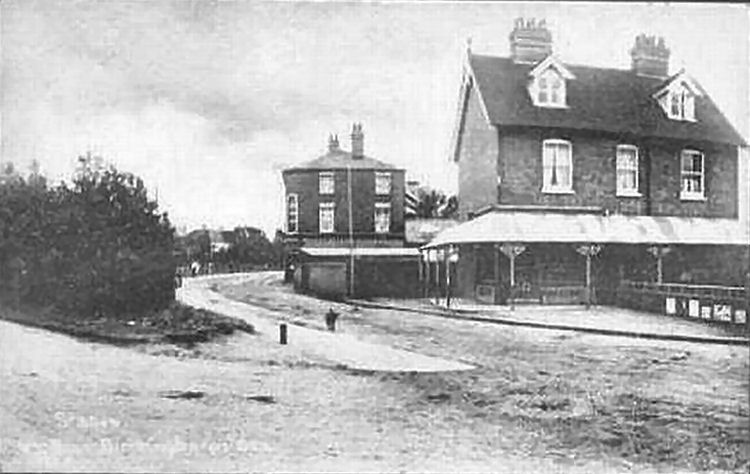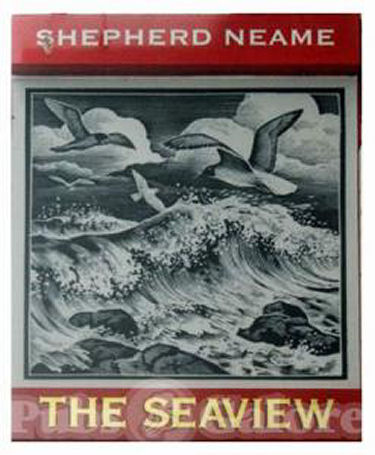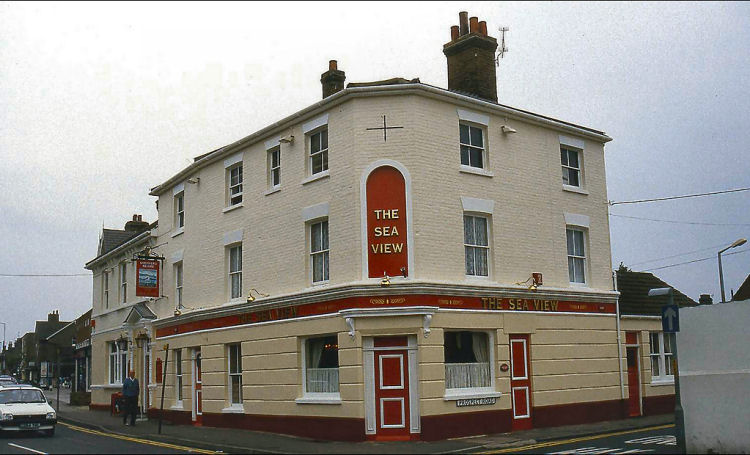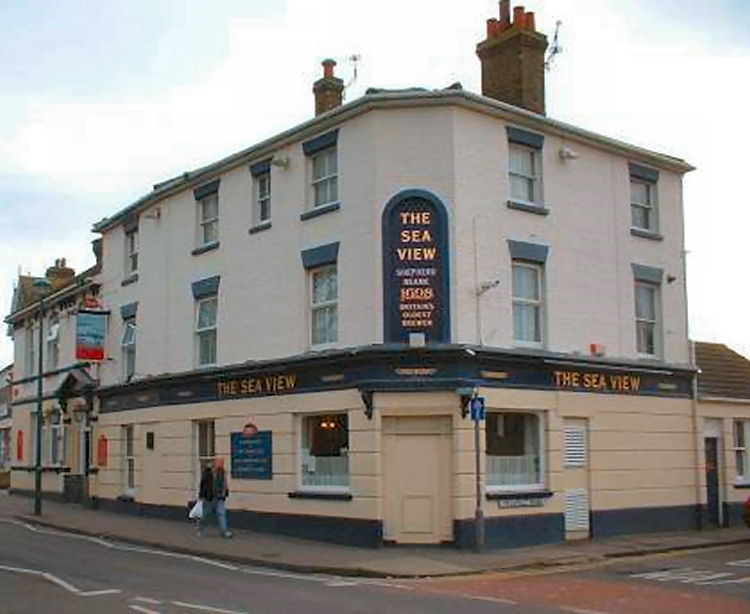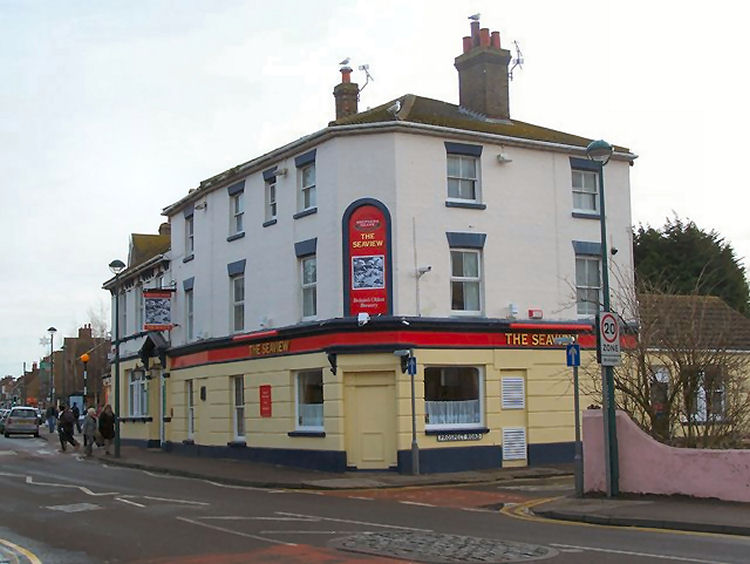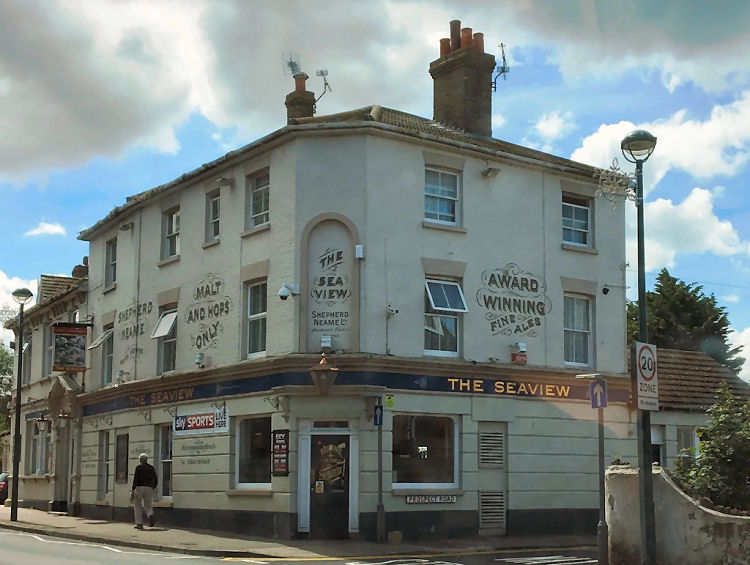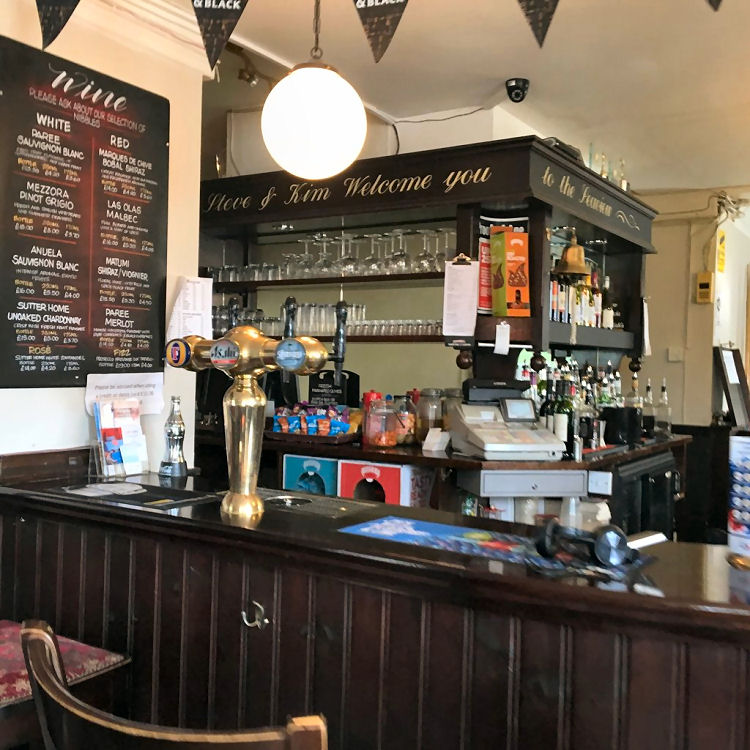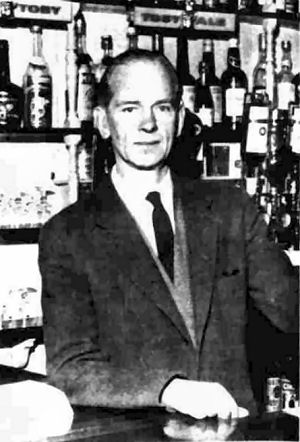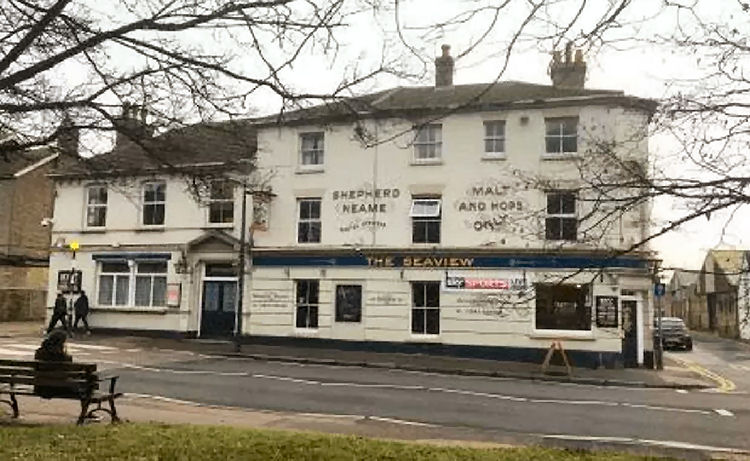|
Thanet Advertiser, Saturday 25 July 1874.
THE LATE FATAL BOAT ACCIDENT AT MARGATE.
INQUEST ON THE BODIES.
On Saturday morning the inquest on the bodies of three of the
unfortunate persons who lost their lives by the sad boat accident on the
previous Thursday was commenced, at the Town Hall, before T. H. Boys,
Esq, borough coroner, when the following evidence was adduced:—
The bodies of the deceased Mr. Joseph Jeffery, Mrs. Selina Jeffery, and
Mr. William Houghton Flintan, having been viewed in the dead house Mr.
Foster Jeffery, colonial agent, of 4, Crown-Terrace, Lavender-hill,
London, identified the bodies of Mr. and Mrs. Jeffery as his brother and
his wife. Witness added: The former it 41 years of age, and the latter I
should think about 38. My brother was an auctioneer, and lived at 11,
Bessborough Gardens. Pimlico. I last saw them alive about three weeks
ago, in their usual health. I only heard of the accident yesterday
afternoon.
Mr. William Flintan deposed:- I live at Maida Villa, Upper
Richmond-road. I identify the body of William Houghton Flintan as that
of my son, who would be 21 in August next. I last saw him about six
weeks or two months ago in good health. He was a cripple in the hip
joint, but he could swim or walk a mile well.
Wm. Hawse, a mariner, belonging to Colchester, said:- About eleven
o'clock yesterday morning I picked up the body of the deceased Mr.
Jeffery off Deal. It was floating, and was dressed in a blue serge suit.
I brought it into the roads, and came into Margate and reported it. A
Margate boat then came out and fetched it in.
George Morris said:- I am a boatman, and live in Margate. On Tuesday
last I was on the Pier, and seeing the Prince of Wales stop a short
distance out I and others manned a boat and went to her. We were then
informed that a boat had capsized. We went to it — about three miles
from Margate — and found the boat bottom upwards. We turned it over and
were towing the boat in, and in clearing the sail rope round his neck.
Besides the "painter" rope he was held fast with the sheet. We cut the
rope, and the other boat being a lighter boat we put the body in that
and sent it ashore. I thought if there was any life he should be put
ashore as quickly as possible. The knot tied was a "timber hitch," and I
believe he was trying to put it over his arms and it got round his neck.
The sheet was dragging in the water.
Mr. William Augustus Morley deposed:- I am staying at ths "Sea View
Hotel," Birchington, and my London address is 1, Stockwell crescent,
Clapham-road, and I am a partner in the firm of George Stower and Co.,
Jury Street. I made the acquaintance of Mr. Jeffery down here, and we
agreed to go out for a sale from Epple Bay on Thursday afternoon last.
When we started it was about twenty minutes to three o'clock, according
to Mr. Jeffery's watch. The party consisted of Mr. and Mrs. Jeffery,
Miss Moore, Mr. Flintan, Mr. Ackery, myself, and three coastguardsmen,
named Hedge, Miller, and Elliott. The boat was the galley, a long boat.
The weather was very fine, but with a heavy swell on the sea. They
thought it was a good wind for a sail. Within two minutes after starting
we put the sail up, and went we think, about two miles. We went out
comfortably without shipping any water. About three o'clock Mrs. Jeffery
felt ill, and said she should like to return, and we turned round for
the purpose of returning home.
In reply to a question the witness said he thought the deceased wished
to return, first because she was ill, and secondly because she was
alarmed.
Examination continued:- We think it was about six or seven minutes after
we were on our return, when a sea suddenly came into one side of the
boat and we were all in the sea in a moment. It came in the contrary
side to the swell, and not where I should have expected. The sail was
up, and Hedge, the chief boatman, was steering. The sheet was held by
one of the boatmen and not tied. When the sea came in, as far as I can
recollect, we were all thrown out. For some few minutes I was
unconscious of what took place, but when I rose to the surface the boat
was bottom upwards. The first thing I recollect was Mr. Flintan laid
hold of me and dragged me down, but I am unconscious of how be got loose
from me. The next thing I recollect was swimming to the boat and
catching hold. The boat then turned over, and I cannot say for certain
whether I took hold of the keel or the top. When I got to the boat I
only saw three persons — one boatman (Miller), Mr. Ackery, and myself. I
remember seeing Hedge, and hearing him say "Let me try and right
the
boat," but when it was I do not know; I think it must have been before
this. I think it must have been before Mr. Flintan took hold of me,
before I came up then. I saw Mr. Jeffery about fifty yards off, as if he
was floating and expected to be picked up. He appeared to me to be
conscious, and not at all like a dead man. I saw one lady by the side of
my friend Mr. Ackery, and that turned out to be Miss Moore. I said "Is
she gone?" and Mr. Ackery replied "Yes." Afterwards I saw poor Flintan
some distance off, as it seemed to me in the rigging. He apparently
looked dead. We can only say from conjecture how long we were in the
water; but I looked to the Jetty, hoping to see the steamer, and she had
not then left. We thought we were in the water about forty-five minutes,
supposing the steamer left the Jetty at half-last three. It must have
been from seven to ten minutes past three when the accident happened,
and I suppose the steamboat would take about a quarter of an hour to get
from the Jetty to us. We had great difficulty in clinging on to the
boat, as she constantly turned over. As soon as we got on to the keel
she turned round, and we had to swim for her again. The next thing I
recollect was the steamer coming up. I saw the smoke, and we hallooed as
soon as she got near us, but I fancy the captain saw us before. It was
wonderful the way they got a boat out to assist us. The steamer stopped
about a hundred yards beyond us, and the boat was lowered instantly and
sent back to us. We were all very much exhausted when we were picked up.
I heard a boatman on the Prince of Wales say "Here is a woman." I was
almost unconscious at the time, but I recollect seeing a woman put up
into the steamer, and we were all brought back to Margate Jetty. I
cannot say that I know much about boats. There were nine of us started,
and I said to Hedge, the chief boatman, "Don't you think we are rather
heavily set; shall one of us go forward?" and be replied "No, you cannot
be better than you are." I should not say we were overladen for another
boat, but I never liked that boat. It is, I think, 24 feet long. We had
been twice before in the same boat, and with two of the same boatmen.
Hedge, and another. The first time four of us went, and the second time
seven, Mr. Flintan being away in London. The boat behaved very well on
these occasions. When we had seven we sailed as far as Reculvers, and
had to row back. There was then very little wind and no sea. I could not
say whether we asked them to take us for a sail or they asked us. I did
not know it was contrary to the rules of the coastguard service. On the
contrary, Hedge said it was not against the regulations to take us out
in a friendly way. Mr. Jeffery said he was going out, and I said I
should like to go.
The Foreman:- Who engaged the boat?
Witness:- It was a joint affair. We have upon previous occasions given
the men something.
Mr. Wright:- Had there been any other boatmen, would you have employed
them?
Witness:- We should have employed other boats in preference. The boat
before this occasion, had not more than seven in to my knowledge.
By Mr. Cobb:- We went straight out to sea, and came back nearer to Epple
Bay than Birchington.
By another Juryman:- I have not the slightest idea how the sail slipped.
There was no crash. The water came from the opposite side of the boat,
and contrary to the swell.
By the Coroner:- A coastguard handled the boat all the time, and they
were quite sober.
The witness here stated that he should like to bear his testimony to the
faithfulness of the three coastguardsmen. They behaved well, and he
thought that ought to come forward. They behaved remarkably well. It was
purely an accident and there was nothing on board in the shape of
refreshments. They were first-rate men, and no blame was attributable to
anyone.
The witness Morris was here re-called, and in reply to the Coroner as to
whether the mast was broken when they found the boat he said "No; I
heard Knight, who was with me, say that the iron off the thwart was
gone, but I did not notice the boat myself. It looked as though it had
slipped out and was shoved under the thwart to prevent it falling out.
The Coroner:- has the mast remained in the boat would it have assisted
in righting her?
Witness:- Oh, no, sir. The sail was all down and so were the halyards.
Joseph Knight, boatman, gave corroborative evidence. He added that there
was a little hole in the boat, which might have been caused either by
the mast coming out, or that it might have been occasioned by the
anchor, which they threw out to turn the boat over. Witness saw nothing
to lead him to believe that the boat had been badly handled. Where the
boat went out there was more sea than in all the roads.
In reply to the Coroner, the witness said that he thought that nine
people in the boat on such a day were too many. He thought it unsafe; so
unsafe that they would not think of taking out such a number in their
own boats, which were wider in the beam than the one in question.
Mr. John Ackory deposed:- I am staying at Birchington, am studying as a
dentist, and reside at 86, Kennington Park-road, London. Last Thursday
evening I went out for a sail from Epple Bay and formed one of the
party. I was sitting in the boat on the same seat with the boatman
Miller and we had been out about half an hour when the accident
occurred. One of the boatmen said we were out about a couple of miles.
I was sitting talking to Miller when the boat filled. We all went out
and I was thrown into the middle of the sail. The wave came on from one
side slightly and the boat filled from the other. We went out the side
the boat filled. When we first capsized I was thrown into the middle of
the sail and I struck out to clear myself and then swam back to the
boat. When I got back the boat was in its proper position, but filled
with water. I think Hedge had turned it over. Hedge was at the other
side of the boat, Millar was at the stern, I got about the centre, and
Mr. Morley was at the bows. Those were all I saw. Hedge seemed to be
totally overcome in a few minutes, dropped his head and shortly after
disappeared. Before that I heard him say "Let me right her." We judge we
were in the water about 45 minutes before the Prince of Wales came
along. I sprang up the side of the steamer I hardly know how, and was
taken down to the cabin, so I saw no one landed I had been out in the
same boat before, and I did not feel at all nervous when I started out
on Thursday. Hedge said it was safe, remarking at the lime that he was
too careful of himself to go out if there was any danger.
Mr. Morley here stated that both Mr. Jeffrey and he had asked Hedge that
morning about the safety, and he replied that he had a wife and six
children, intimating that there was reason why he should be careful of
himself. Hedge also said "If I thought that there was the slightest
danger I would take the corks, but there is no necessity of taking them
and lumber the boat."
Mr. Wright:- Then a long conversation must have taken place between you
and the boatman in reference to the matter. Something must have occurred
to you.
Mr. Morley:- It was a choppy sea and I thought it necessary to put the
question to him. If he had said it was not safe I should not have gone.
Mr. Wright:- What was your motive for asking? Did you think the sea was
dangerous?
Mr. Morley:- I could not say what sort of a sea it was except that it
was choppy and I did not like it, and I thought if there was any danger
that would have ended the matter, and we should not have gone.
Mr. W. H. Thornton, surgeon, practising at Margate, deposed:- Last
Thursday evening, about twenty minutes past four o'clock, I was fetched
by a flyman to the Jetty, and on going down the Jetty I met the deceased
Mrs. Jeffery being carried towards the warm baths. It struck me when I
first saw her that she was dead. There were two gentlemen working her
arms about with the idea of producing artificial respiration, and
considering the difficulties of the position I think they were doing
right. She was taken to the warm baths at Phillpott's and artificial
respiration carried on for some considerable time, although it appeared
from the first a perfectly hopeless case. I saw no external marks, as
far as I could examine, and there was but little doubt she was drowned.
Mr. Flintan went through the same process half an hour afterwards, but
he was hopelessly gone. In both cases the eyes were placid. I saw no
mark of a rope round Mr. Flintan's neck. I should think he had been
drowned; there was a most peaceful expression of contentance and no marks
of strangulation.
By the Foreman:- I do not know what means were adapted on board the
steamer, but artificial respiration is the chief thing and that could
have been done on board. I suppose something was done there, but I think
Mrs. Jeffrey was past all hope. There was some gentleman moat
indefatigable.
Superintendent Compton at this stage said that was all the evidence he
should be able to produce to-day. The boatman Miller was very ill and
could not attend the inquiry.
Before adjourning it was thought desirable to examine Mr. Edward Latto,
chief officer at the Epple Bay Station, who gave evidence as follows:-
On Monday afternoon last I went on leave, leaving the station a little
after one o'clock. I returned at nine, and did not hear of the accident
till then. While I was absent the chief boatman, John Hedge, bad charge
of the boat and was responsible during my absence. The general order is
never to run any risk with the boat. It was contrary to all roles to run
my risk. Taking personal friends out for a sail or row is done, but not
for payment. Where there is no boat and a gentleman asks for a sail, as
long as there is no charge made, I don't think it is against the
regulations of the service. I gave orders that no payment was to be
received. I know Mr. Jeffery, as he lodged within 50 yards of my house.
Mr. Morley here informed the court that Mr. Jeffery had said that Mr.
Latto had particularly told him not to give the men anything, but be
said "What I purpose doing is to get them a book each when I get back to
town."
Mr. Latto:- I have seen Miller, and although it is not right to disturb
him now I think he will get better.
The Foreman:- I understand then that it is not contrary to the rules to
take persons out in your boats. A guard for instance could not givo a
ride in his break for nothing.
Mr. Latto: There is no order to say I can do it, but it would be hard if
a friend asked me and I could not do it.
The Foreman:- Do you think the boat is fit to carry nine people?
Mr. Latto: Yes, if it is fine weather.
The Foreman:- It is a narrow boat, is it not?
Mr. Latto:- It is five feet.
The Coroner:- Did you notice the sea when yon left?
Mr. Latto: It was not as bad as afterwards, and there was not much wind
then. If I had been at the station at the time they went out I should
never have let the boat out at all under the circumstances.
Mr. Foreman:- Was she seaworthy?
Mr. Latto: Oh, yes, in fair condition.
Mr. Wright:- For nine persons?
Mr. Latto: Yes.
The Coroner:- Then you would not have objected to the boat going out
because there were nine people in her, but simply on account of the
weather?
Mr. Latto:- Yes, simply on account of the weather.
The Foreman:- Would you have let the boat go out with six people that
afternoon?
Mr. Latto:- No, not at all if I had been at the station.
Mr. Kennard:- Is the boat as large as the row boats on the beach here?
Mr. Latto:- As long, but of less depth. It is a galley — a usual
coastguard galley.
The Coroner then intimated that he should adjourn the cause until
Wednesday next for the attendance of the boatman Millar. If in the
meantime he found Millar got worse and could not attend he should most
likely go and take his disposition. The disadvantage however of that
would be that the Jury would not have an opportunity of asking him any
questions, and he therefore suggested that the Foreman might go over to
Epple Bay with him (the Coroner).
This suggestion was concurred in by the Jury, and the enquiry was then
formally adjourned till ten o'clock on Wednesday morning next.
THE ADJOURNED INQUEST.
The inquiry was re-opened at the Town Hall on Wednesday, when Henry
Miller said:- I am a coastguardsman at Epple Bay. On the day of the
accident John Hedges, the chief boatman, came to me at one o'clock, and
said he was going out in a boat with a party. Witness said he did not
feel well, but did not mind going. They left at half-past two o'clock.
The boat was perfectly seaworthy, and did not leak at all. We had
lug-sails with two reefs. The last time I was out in the boat was a few
days before the accident. I think Mr. and Mrs. Jeffrey were in the boat,
and that the master was taken with seasickness. On the day of the
accident John Hedges was steering the boat. Persons were sitting aft and
forward. In my opinion the boat was properly trimmed. I don't consider
there were too many persons in the boat. A heavy sea, or sort of whirl
of the sea, caught us. The water came just over the starboard quarter. I
let go the sheet. I never saw a party sit so quiet as this party did.
The boat was partly filled with water before she capsized. When I was
thrown into the water I twice tried to get up, but could not. I lost
sight of Elliott, but saw Mr. Jeffrey with his arms extended floating. I
lost Miss Moore all at once; I gave her my handkerchief to hold on, and
told her to do so tightly. I saw Hedges once or twice after the boat
capsized. The waves turned the boat over and over several times. To the
best of my belief we were in the water more than half an hour before the
"Prince of Wales" came up. I have always been a good swimmer, and have
heard that Hedges was good at swimming. The other poor fellow (Elliott),
I believe, could not swim. I did not see any persona picked up by the
"Prince of Wales."
By the Jury:- I have had great experience in seamanship. The boat has
not been long at the station. We only use the boat occasionally for
pleasure trips; it has not been used more than two or three times. I
have never been refused the use of the boat. The party that were in the
boat on the day of the accident were. I may say, friends; they were
living close to the station. I have never had payment. When the slight
breeze came the boat refused to rise with the waves. I did not see any
rush. Hedges said something, but I could not make out what it was. I
hardly know what I was doing myself. Had I thought there was any danger
I should not have gone. I should not have got into any trouble had I
refused to have gone out with the party.
Mr. Wright, one of the jury, said he had heard it remarked that the sea
on the day of the accident was not fit for the boat to go out.
The witness said the wind changed after they had left, and, in reply to
further questions, said that had the boat been started in an opposite
direction the accident might not have happened. The boat was steered to
a dangerous part.
By the jury:- It was a sort of cross sea, and the tide was just turning,
which caused the sea to bubble.
Mr. Wright:- Is not the tide always more dangerous at this part?
Witness:- The tide is always different there to what it is elsewhere.
One cannot sail there as in other parts, the crossing of the wind and
tide together caused the accident.
Mr. Wright:- To your knowledge, have orders been issued by the Custom
House authorities prohibiting coastguardsmen from taking passengers out?
The witness replied in the negative, and said that friends were only
occasionally taken out in the boat, and no charge was made. He was off
duty at the time. He believed that had there been a man at each end of
the boat that it would not have capsized.
Mr. Wright said Mr. Edward Lotto had said that the boat was not safe.
Mr. Latto said he was away from Epple Bay at the time when the boat
started, and therefore could not speak about the matter except from what
he had been told.
The witness said ha had not the slightest apprehension of danger when
the boat left Epple Bay.
The Rev. Mr. Benham said he should like the opinion of a practical
boatman to the accident, as it would be satisfactory to the public, as
there were rumours of indiscretion on the part of the boatmen, it having
been alleged that the weather was unfit for boating.
The Coroner did not think it necessary to have the opinion of boatmen,
as two of them might give quite different opinions.
Mr. Lee, a gentleman, well acquainted with boating, and who happened to
be in court at the time, then expressed his opinion on the subject, at
the request of the jury, and said that on the day of the accident the
wind went down. He did not agree with Miller that the boat was heavy.
The accident was caused in consequence of the sea following the wind as
it lulled. He did not think that it was exactly prudent for so many to
have gone out in the boat.
Miller, the witness who gave evidence, said the wind freshened about
twelve o'clock.
Mr. Morley said, as regards the evidence given by him on the first day
of the inquire, he wished it to be known that he had only engaged the
boat once on a previous occasion, in conjunction with Mr. Jeffrey.
Miller, in reply to a question from the Rev. Mr. Bonham, said it was the
duty of the coastguardsmen to watch the sea and look out for vessels.
There were stations at both Westgate and Epple Bay. He could not say
whether any of the men at these stations saw anything of the perilous
position of the party.
Mr. Lee said had be been in charge of the boat he should have given more
sail.
Lieutenant Lyon said in his opinion an opposite sea came, and the boat
had not time to prepare for it. He did not think there was any
indiscretion in going out in the boat on that day.
The jury then viewed the boat and a general opinion prevailed that the
boat was sufficiently large for the number that were in it on the day of
the accident, and several of the jurymen thought it was safe enough for
a dozen.
The Coroner summed up the evidence, and in the course of his remarks
said the jury would not have to consider whether or not the
coastguardsmen were right or were wrong in taking the party out, as this
was a matter for the consideration of the Government authorities. If
anyone was to blame it was the chief boatman, who had been drowned. The
boat appeared to be in good condition, and complete in every respect; it
was not a boat that had been laid up on shore. The question of the
extension of sail was a matter of opinion. There seemed to be an
impression that had the two sails been shaken out the accident would not
have occurred; but the evidence proved that every care had been taken,
and that there was no sign of negligence whatsoever. The jury would have
to consider whether the boat was over laden, but in his opinion it was
fully competent for the party. He thought the seats were rather too
high, and perhaps this caused the boat to be top-heavy. Of course, this
was merely an opinion of his own. Taking all the circumstances of the
case into consideration, he thought the jury would do well to adopt the
advice of Dr. Thornton, and return a verdict of death from drowning.
The jury deliberated for about an hour, when the following verdict was
returned:- "We are of opinion that the three persons, Joseph Jeffrey,
Selina Jeffrey, and William Houghton Hinton, were accidentally drowned
by the capsizing of a coastguard boat, and that the accident was caused
by the boat not having enough sufficient was on her to cause her to rise
quickly enough over the sea. We are also of opinion that during the trip
all care was taken by the boatmen in the management of her, and that
after the catastrophe they did everything that lay in their power to
save the lives of their companions. We desire further to express our
high sense of the admirable conduct of the captain and crew of the
Prince of Wales steamboat for their energetic exertions on behalf of the
survivors; and we would also add that high thanks are due to Mr.
Philpott in giving the gratuitous use of his baths, &c. in the efforts
that were made to restore life."
The Coroner thanked the jury for the attention they had given to the
case, and the proceedings terminated.
The following letter appeared in the daily papers of Monday:—
Sir,— Will you kindly allow me the use of your columns for an appeal to
the benevolent on behalf of the widows and families of the two
coastguardsmen whose lives were lost in the sad boat accident at
Birchington on Thursday, July 16th? One of them leaves a wife and six
children, and the other a wife and three children. Both were sober and
well-behaved men, possessed of three good-conduct badges, one of them
having been lately promoted, on account of his having been just
recommended for promotion by the Inspecting-commander. It is hoped that
a sufficient amount may be raised in answer to this appeal to place the
unhappy sufferers out of reach of poverty, as beyond paying into the
Compassionate Fund (from which but a very small sum will be received) no
provision could be made. The third coastguard in the boat was picked up
in a very exhausted state — after endeavouring to save the life of one
of the ladies, and is now obliged to keep his bed. He has seven
children, and his wife is expecting her confinement very shortly, so
that it is desirable that something also should be done for him. The
facts of the case can be testified to by the survivors, or by the
Inspecting-Commander, Captain Leicester C. Keppel R.N., Ramsgate; and
any donation will be thankfully received and acknowledged by Lieutenant
C. Lyon, R.N., Birchington; Mr. W. Larchin, Birchington; or by myself;
or can be paid into Messrs. Cobb's Bank. Margate.
I am. Sir, yours, faithfully,
J. P. ALCOCK, Jun., Vicar of Birchington, Thanet.
|
